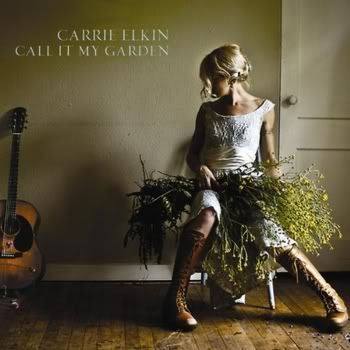
[purchase]
Last week, I reviewed Danny Schmidt’s new album, and I mentioned that Carrie Elkin sang background vocals. This time, it’s Carrie Elkin’s new one, with Danny Schmidt singing in the background. The two are currently touring together, and in fact, they are a couple. But they are two very different people, a fact which Elkin celebrates in some of the songs here, and Elkin makes this album her way.
Call It My Garden is an appropriate title. It implies that it is not perfect, but it is what I wanted. There were weeds to be pulled, and there will be again, but there is great beauty, at least some of which will endure. The phrase implies to me that the gardener has reached a sense of peace about the fact that the tending is not done. So the album is a set of heartfelt songs, but the performances have a looseness that lets the listener in. Sometimes Elkin or one of the band members counts off the beat at the beginning of a song. The album ends with a bit of chatter between the members of the band that might refer to the song or the album as a whole.
The basic band here is Carrie Elkin’s acoustic guitar, plus banjo or mandolin, dobro, and electric or acoustic bass. Sometimes there are drums, other times an organ part or an electric guitar joins in, and there is sometimes a cello. Edge of the World closes the album with a martial drumbeat and an accordion part which combine to create a carnival atmosphere. You could combine most of these instruments and wind up with something with a bluegrass feel, and that happens on Jesse Likes Birds, which opens the album. But, after that, the sound changes. These are songs which were written on guitar and then the mood was embellished and amplified by the inclusion of the other instruments. On top of all this is Carrie Elkin’s voice. She sings in a twangy alto, and her voice is strong and clear most of the time. But she has a little quirk that could be a disaster for another singer but really works for her. Sometimes, usually at the end of a phrase, Elkin lets all of the air out of her voice, and finishes a phrase in an almost spoken whisper. For Elkin, this is a way of adding emotion to her singing, and she really makes it pay off. Her voice is certainly good enough to carry a song by herself, but Elkin uses a lot of background singers as well. This can be a single male or female voice harmonizing with her, or there is sometimes a chorus of voices.
The garden metaphor I mentioned earlier also applies to the lyrics. Jesse Likes Birds opens things in an emotional comfort zone. The song interpolates Mocking Bird, A song which I always think of as being song by a parent to a child, as a promise to make things right. But that is followed by Guilty Hands. Here the singer is questioning her religious faith. In the garden metaphor, seeds have been placed in the ground, but nothing grows yet. Will it? Those first young shoots are the appearance of love, but here the lovers must be apart at times, and there is the both the ache and the insecurity that separation brings. Lift Up the Anchor captures this perfectly. From here, the love ebbs and flows. Obstacles appear, weeds, if you will, and are not so much overcome as compensated for. Landeth By Sea is the hopeful expression of the sense that the differences between two lovers can complement each other, beautifully expressed. In St Louis, Elkin’s narrator thinks about how her previous relationships haven’t lasted, and seeks reassurance that that won’t the case this time. Shots Rang Out would seem to be from another album at first; it is a telling of a dark and harrowing episode that had nothing to do with the current relationship. But isn’t there a dark moment like this in all of us, and isn’t there a moment in a new relationship where you take the risk of telling your partner about this dark time? I think that’s what this song is doing here. Edge of the World concludes the album, and here there is almost a humorous tone, as the narrator reaches the conclusion that the relationship isn’t perfect, because that kind of perfection doesn’t exist, but that’s OK. There is enough there to dream of a shared future, and that is love, really. There will be more weeds in the future, but it’s OK.
It is possible that I have no idea what I’m talking about here. I am not a gardener myself. But I do know that Call It My Garden struck an emotional chord with me. And that is what good art should do.
Carrie Elkin: Landeth By Sea
Carrie Elkin: St Louis






0 comments:
Post a Comment